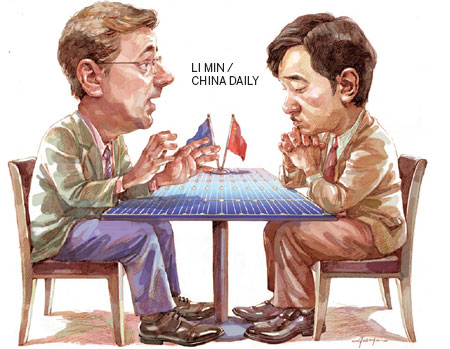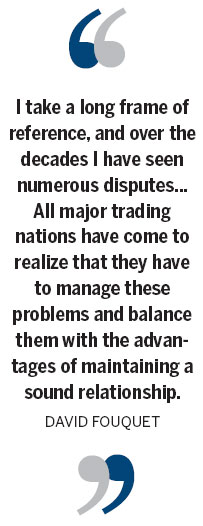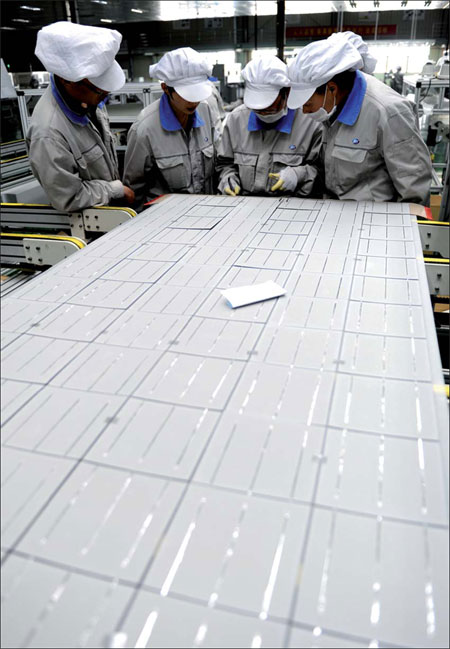Panel discussion
Updated: 2013-06-21 08:56
By Fu Jing (China Daily)
|
|||||||||||

|
Workers inspect a solar panel at Shenzhou New Energy Development Co's production line in Lianyungang, Jiangsu province. Geng Yuhe / for China Daily |
Talks keeping a lid on trade feud with EU
As China and the EU continue to be at loggerheads over alleged solar panel dumping and possible penalties, a deft diplomatic game is being played out behind the scenes as officials try to keep the Sino-EU relationship from unraveling. The main aim has been to keep economic and political dialogue going, and what is preoccupying many is a scheduled summit of both sides' highest leaders in November.
All of this has been going on as negotiators in the solar panels dispute have wrestled to find a compromise in Brussels this week after a punitive anti-dumping tariff of 11.8 percent was imposed on Chinese exporters two weeks ago.
 |
If that were not enough to contend with, observers say bilateral economic and trade relations are expected to continue going through tough times amid weak economic growth in Europe; and Beijing's decision to investigate wine imports from the EU has added to the mix.
Moreover, China may choose to set up closer economic relations with individual EU member states if Brussels does not draw back on what Beijing says is protectionism. However, an official source has played down that possibility, saying Beijing strongly supports European integration and that both sides are now working closely to find solutions to bolster bilateral relations.
For example, the European Trade Commissioner, Karel De Gucht, and his Chinese counterpart, the Minister of Commerce, Gao Hucheng, hold a meeting of the EU-China joint committee, a trade dialogue body, on June 21. But De Gucht's spokesman, John Clancy, says the solar panel dispute is not high on the meeting agenda as price negotiations are underway in Brussels.
Brussels may also discuss with Beijing when to begin talks on a bilateral investment agreement. It recently obtained a mandate from member states to negotiate with the US on the Transatlantic Trade and Investment Partnership.
China's State Councilor Yang Jiechi may hold talks with his European counterpart, Catherine Ashton, either in the second half of next month or in September.
"And these meetings will pave the way for the summit in November and be helpful in solving the solar panel dispute," says a source from the Chinese side.
But Duncan Freeman, senior research fellow at the Brussels Institute of Contemporary China Studies, says: "At the institutional level the EU-China trade relationship is going through a difficult period."
Brussels is bound by regulations once an anti-dumping complaint has been initiated, even if the present one was lodged amid strong protests from member states, he says.
Some observers say the current surge in disputes is mainly the result of Brussels' difficulty in having to accept the rise of emerging economies such as China even as its own economies stagnate. Even though there are signs that next year the eurozone may be able to shake off its second recession in six years, its jobless rate is likely to remain as high as 12 percent. And some in Europe insist that it is the emerging economies that have taken away European jobs.
|
||||
Freeman says the solar panel dispute is one of the most significant since disputes over footwear and textiles, in which European factories have generally lost their competitive edge. However, he insists that these disputes are not fundamental to the flow of trade, which is determined by economic conditions and other factors in the EU and China.
"Broadly speaking, the prospects for growth in the EU are weak, and this will continue to have a negative impact on Chinese exports, and there is little prospect that this will change in the near term," Freeman says.
China's economic growth is also slowing, he says, and this will limit EU exports to China. Growth of investment in fixed assets in China has been notably slow, which bodes ill for sales of capital goods from Europe.
Christopher Lewis, senior fellow of the Schiller Institute in Germany, says that unless there is a change of direction, the economic relationship between China and the EU will become highly fraught. "The reason for this is that Europe is very much dominated by British-style monetarist policies controlled by the European Central Bank. There is a desperate attempt by London and Wall Street to save the bankrupt system through the printing of dollars and euros."
It is likely China will focus more attention on bilateral economic and trade relations with EU member states if Brussels is intent on protectionist measures aimed at Beijing, Lewis says.
"As was seen from the European visit of Premier Li Keqiang in May, there is some resistance from the Germans."
German Chancellor Angela Merkel was notably reticent about becoming enmeshed in trade disputes with China, and Li said Germany could be given priority access to China's market, although he emphasized that he supported European integration.
Despite that, Lewis says that because of European institutions' fragmented regulations, China would be best served by dealing bilaterally with individual European countries.
David Fouquet, director of the Asia-Europe Research Network in Brussels, says that how both sides act during the next stages may be critical.
Related Stories
Dumping case defies solution 2013-06-21 08:56
Vines shake in bitter trade wind 2013-06-21 08:56
Firms give industry expo a miss 2013-06-21 08:56
Light from the solar panel darkness 2013-06-21 08:56
China would do best if it circumvented EU 2013-06-21 08:56
Today's Top News
List of approved GM food clarified
ID checks for express deliveries in Guangdong
Govt to expand elderly care
University asks freshmen to sign suicide disclaimer
Tibet gears up for new climbing season
Media asked to promote Sino-Indian ties
Shots fired at Washington Navy Yard
Minimum growth rate set at 7%
Hot Topics
Lunar probe , China growth forecasts, Emission rules get tougher, China seen through 'colored lens', International board,
Editor's Picks

|

|

|

|

|

|











